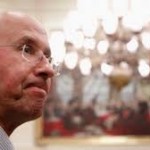At our house, we still have something of an Earth Day hangover. EcoBride, naturally, was at the centre of several events over the weekend, and I was over-doing it, too. In other words, we were pooped before the work week even began. Mainly, though, my brain is buzzing from renewed attention to environmental responsibility. Time to be mindful. Time for a change. Lots of changes.
Sheesh. I should have a T-shirt printed for myself: I DROVE MY CAR TO THREE EARTH DAY EVENTS. It wasn’t all laziness and irresponsibility. Event the first, Saturday’s “Sacred Earth” meditation/story-telling/dance session, and the EcoFair that followed it, required some materials to be transported and was followed by another event across the city. I had a shaky excuse for Event the second, David Suzuki’s talk Sunday at the WritersFest. I was going to bike to it — I really was! — after riding with Li’l Bozo to a schoolmate’s birthday party. EcoBride was off on her B bicycle, which left her A machine and my hunk o’ crap to choose from; however, both had flats and the party was starting and tears were flowing. Sigh. As for Event the third? It was another WritersFest talk on “The End of Food”. I was just tired and lazy. I drove.
But enough of my excuses. If you’re a Canuck, you likely know who David Suzuki is. If you’re not, but you pay attention to environmental heroes and the sustainable changes they long for, you probably know him, too. (But check out his Foundation here, whether you think you know him or not. It will help you live well. Really.) Suzuki is over 70 now, but his passion for environmental issues burns hotter than ever. His Earth Day message at the Ottawa International Writers Festival – besides his eco-evangelism and television fame, Dr. Suzuki has written over 20 books – was characteristically smart and skilled, but I’d never heard him so emotional. He was a volcano. He has grandchildren. He has been banging the drum of ecological warning for decades, and absolutely fumes at the continued political dithering and partisan point-scoring. He is outraged and desperate.
And so, he says, he was quite taken aback when his 27-year-old daughter, Severn, told him recently, “I think we’re living in the most exciting period in human history!” She’s been an environmental crusader herself since, aged six or so, her famous father caught her selling off his hardcover books to raise funds for the rainforest. And David Suzuki has come to accept her viewpoint, though he couches it in rather more dour terms: “Exciting? Well, yes. We will, in this relatively brief period of time, decide whether or not we are just a spectacular flash in the pan as a species.” His energy and his arguments were exciting, but even though he went over his allotted time (none of us were grumbling), he hadn’t the time to get to the good news, the hopeful stuff. (“Read Good News For A Change. It’s all there.” Good book.) The consistent mis-steps and political forgetfulness, the rampant materialism and hubris of our societies make for a dismal tale. Suzuki didn’t spare the overflow crowd that had come to hear him on a beautiful Sunday afternoon. Here are some things that stood out to me in his talk.
I still haven’t read Silent Spring (1963). Suzuki paid heartfelt tribute to Rachel Carson and the way she brought ecological issues to the forefront. She also chastised the overweaning pride of scientists, who thought their laboratory findings were universally applicable. (Suzuki himself, self-described “young hotshot geneticist”, had his life changed by Carson.) They thought DDT was a miracle chemical. Suzuki remembers his mother spraying it in the kitchen during meals so no insects would bother them.
“We are an infant species.” By the time recognizably homo sapiens creatures appeared in the Great Rift Valley of Africa, life on Earth had existed for nearly four billion years. Suzuki whisked us back 150,000 years to imagine scoping out these critters, and at first glance we didn’t look too promising: small, weak, slow, with only average senses. But we could learn. Above all, we were the only species that showed foresight. We could analyze, we could predict, and we could plan ahead for the needs of our offspring.
From that small group of Africans, living in a world of unbelievably abundant animals, fish and fowl, our population very slowly grew and spread through tens and tens of thousands of years. We finally reached a billion people only about 200 hundred years ago. But population is now on an incredible upward slope, literally growing through the roof, and at 6.5 billion we are now the most populous mammal on earth. “More humans than rabbits – that really impressed them in Australia! More humans than rats. More humans than mice…”
“Consumption” was the gentle old name for the disease tuberculosis, which in our part of the world barely exists anymore. “But the Earth is now suffering from consumption,” says the good Dr. S., meaning our seemingly insatiable desire to buy more stuff. “The most humiliating Canadian statistic I know,” Suzuki said, “is that, compared to fifty years ago, our families are twice as small but our houses are twice as big.” Monster houses. Unbelievable amounts of stuff that we can’t seem to stop acquiring or know what to do with once we’re tired of it.
After the shock of 9-11, when he made his first public address to the American people, what was President Bush’s first message? What central truth about the reality of citizenship and life did he use to console and inspire his people? “I want you to go out and shop.” Yes. Show the terrorists that nothing can stop us from buying stuff. We consume, therefore we are…
It’s now 15 years since 1700 of the world’s greatest scientists, including most of the living Nobel Prize science winners, issued a dire warning about the declining state of the Earth’s soil, water, and air. They foresaw that continuing along the path we were on in 1992 could lead to a fundamental and irreversible change to life as we know it. (Foresight. Foresight. And we have continued.) Only one problem: neither CBC nor the Globe and Mail in Canada, nor the American newspapers of record (the Washington Post and the New York Times), even bothered to report it. There is always time for celebrity obsessions, of course, but do you remember what we were gossiping about while our greatest minds were pounding on the door, unheard?
Scientists warned that New Orleans was inevitably going to be creamed by the big hurricane, more than 20 years before Katrina. Hello?! Is anybody home?
Good news: human beings are endowed with foresight. We can use our big brains to avoid problems. Bad news: we can get used to almost anything. Adaptability is important, but it also means we can learn to accept the unacceptable, and this is why we need the wisdom of elders and a longer frame of reference than the 24-hour infotainment cycle. Elders remember when the word “disposable” didn’t exist, when wastefulness was considered one of the worst sins. We must listen to what they know. Suzuki reluctantly concedes that he, too, is now an elder.
ECOLOGY: The word comes from Greek roots than mean “study of the home”, understanding how our environment thrives (or doesn’t). Ecology is routinely put on a low-priority shelf, since caring for it might temporarily affect our great political god, the ECONOMY. But listen: the root meaning of “economy” is something like “management of the home”. The overriding principle in running our economies is growth, that there must always be MORE: more production, more consumption, more hours in the working day. “Economists think that growth has no limits!” Suzuki thundered. “THIS IS THE CREED OF THE CANCER CELL!!” We know as a matter of common sense that there must be limits to growth, but our dominating ideas of “management of the home” ignore this.
“Economics must become subservient to the care of the Earth’s ecology, and not the other way around! In the name of economic growth, we have been dipping into the ecological capital of our children and grandchildren! How DARE we say that we cannot afford to care for the environment?!” Wow. Righteous indignation. Suzuki is furious.
And then, by way of hopefulness, Sukuki took us back 50 years. In 1957, he had just completed his undergraduate biology degree in the United States. It was a startling year for Americans: at a time when the U.S. military branches were failing repeatedly in attempts to reach space, the Soviet Union launched the Sputnik satellite into Earth orbit. (And then the first animal, and then the first cosmonaut, and then the first woman in space…) It was the Cold War, of course, and the Americans were shaken to the core by the evident Soviet superiority in science and technology. And so they decided. At all levels of society – governmental, scientific, industrial, popular – there was a national commitment to meet this scary challenge and win it. Nobody complained about the cost. And nobody could have predicted all of the incredible, indirect technical breakthroughs that resulted from the financial and human resources that the United States committed to the Space Race: stunning advances in computing and communications are only two of the most obvious benefits from this investment.
“The world we have now,” Dr. Suzuki reminded us, “where youth in Uzbekistan can whip out a cellphone and call anywhere in the world, where Americans now win nearly every Nobel Prize in science, in large measure was created because the collective will of a frightened United States said, ‘We WILL do this!’” And so, in the face of the catastrophic effects of human growth and waste on our planetary home, we need to summon the same kind of united, cooperative and urgent work on a global scale. And we can’t worry about the price tag! What will be the price if we don’t?
What to do about it? Well, we could start with Suzuki’s Nature Challenge. Don’t wait for the politicians to lead. Let’s lead from the grassroots. Let’s do something ourselves. Dr. Suzuki wants a million people to take the challenge in Canada. “You don’t have to go live in a cave. These are practical but useful measures we can all take in our homes.” We’re signed up. What are you waiting for?
Dr. Dave was once a brilliant young geneticist. Startled by Rachel Carson and other visionaries, he turned his talents to public education, towards a better understanding of the truths and the role of science, and especially towards greater societal awareness of ecology and stewardship. He’s been a TV superstar scientist and a prolific author, and has become over the decades a national hero. He can explain the science of climate change – or of anything – in such a way that jocks and poets can understand it. Suzuki is a master communicator.
But his conclusion on Earth Day was pretty primitive, radically blunt. He was shouting at the politicians, and at all of us whose complacency gets in the way of essential change.
“GET ON WITH IT!”
Because he doesn’t have much time, and neither do we.


